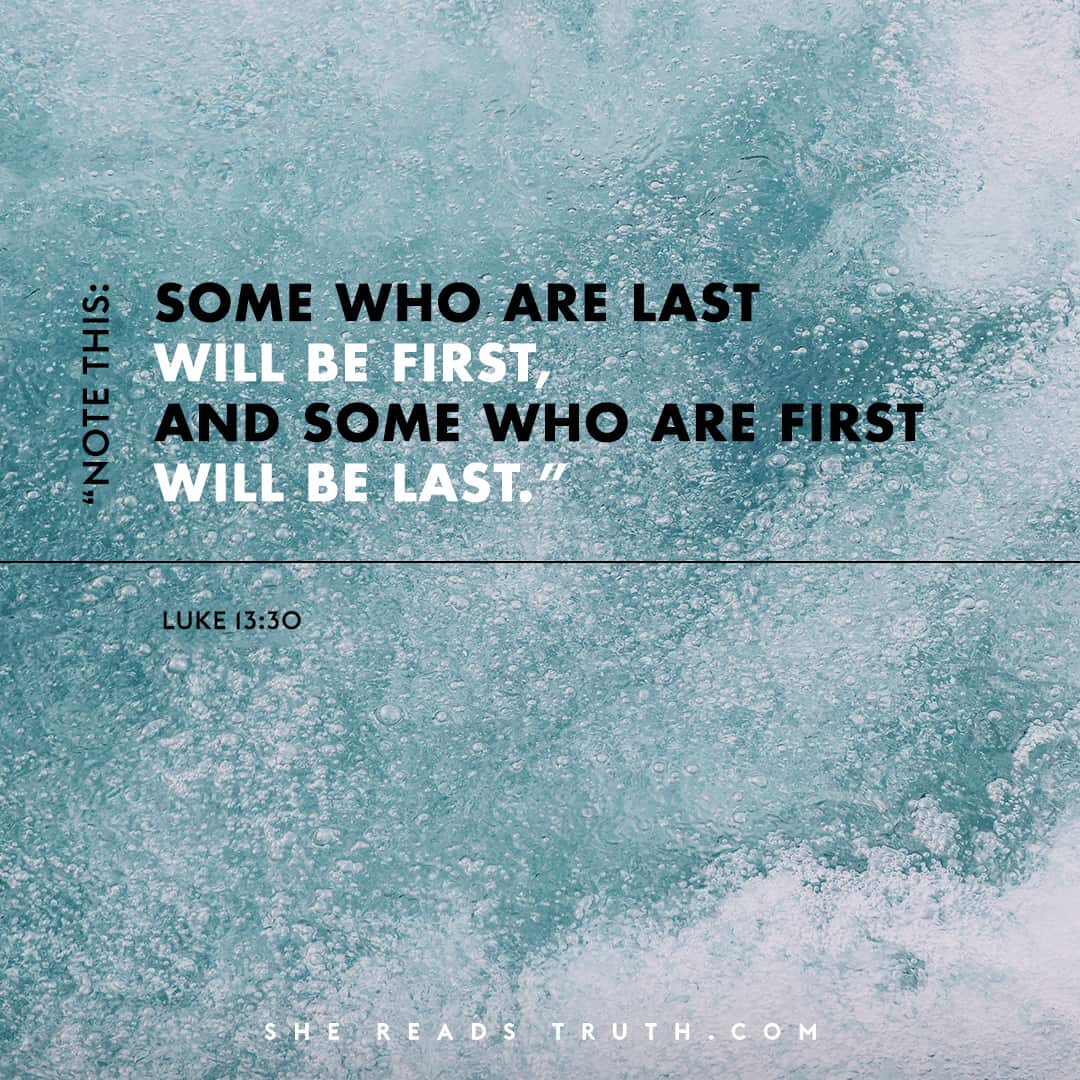In Andrew Peterson’s beloved Christmas album Behold the Lamb of God, he sings the song, “Deliver Us,” based on Jesus’s lament for Jerusalem in Luke chapter 13. He sings, hauntingly,
Jerusalem, Jerusalem
How often I have longed
To gather you beneath my gentle wings.
Even typing these words brings tears to my eyes. Peterson captures, in a way that only master songwriters can, the ache of the ages. The song ends with those lines, an answer to the previous verses that are sung from the perspective of God’s wandering people:
Our sins they are more numerous than all the lambs we slay
Our shackles they were made with our own hands
Jesus’s lament summarizes the history of God’s stiff-necked people. Jerusalem—used here both literally, in reference to the city, and also as a metaphor for God’s people throughout time—had a history of turning away from God and abandoning the prophets, judges, and even the Messiah God had sent to them. Even earlier in this chapter, we see a specific example of the Pharisees questioning Jesus’s miracles. The crowds believed, but the leaders rejected Him.
Despite the innumerable sins of His people and their continuing self-imprisonment due to their own choices, Jesus weeps over the city and the people He came to save (Luke 19:41). God longs to gather His children, to protect them, to gather them under His wings (Psalm 91:4). Jerusalem is His greatest joy (Psalm 137:6), the people He will go to the greatest lengths to save. It is the promise of the whole of Scripture.
Jesus stands outside of the city where He will die, and His lament is not for His death. His lament is for the people He longs to save. He has just finished warning them, telling them that by not believing Him they will not join Him in the kingdom of God. But His lament shows us that He does not make these proclamations about the narrow way out of anger, but out of grief.
“How often I wanted to gather your children together…
but you were not willing!” (v.34).
Even in His lament over the past and current rejection of His people, Jesus knew He would be rejected yet again in Jerusalem. But the steadfast, faithful, persistent love of the Father through the ages, embodied in the person of Christ, never fails. Love would carry Jesus all the way to the cross, into the dark tomb, and ultimately, into the glorious resurrection—where He invites us to join Him, forever.

Melanie Rainer is a bookworm from birth who makes her days writing, editing and reading in Nashville, where she also joyfully serves as the editor of Kids Read Truth. She has an M.A. in Theological Studies from Covenant Seminary, spends as much time as she can in the kitchen, and can’t wait until her two daughters are old enough to read Anne of Green Gables.


These passages remind me of a time in my life when I denounced God, rejected my faith, and lived a miserable life, full of sins. During this time, God chased after me. Time and again, He sought me out through others. It took a lot of people, but I finally found my way back to Him. In hindsight, I can see how I was pursued; His love is relentless! Thank you God for not giving up on me!
I resonate with your words. Thank you for sharing. That relentless love chased me too. I’m forever humbled and indescribably thankful.
Amazing! Who can fathom His love?
I love reading this to be reminded the Love God has for us ❤️
❤️
I am struggling to see where Psalm 137:9 fits into our other readings and devotional for today.
Hey Summer,
I understand, verse 9 seems harsh and very dark! Psalm 137 is a lament written after the fall of Jerusalem and the exile in 587/86 BC. The writer had just witnessed most of their people starve to death, killed or forced into slavery; the city was razed to the ground and the temple (where God was supposed to dwell) destroyed. Later in their history’s, and in the prophets, we see the people understand their own history of sin is what led up to the entire Exile; but the psalm writer isn’t concerned with that at the moment. The writer is in pain and feeling anger and despair at the situation. This psalm is lamenting all that is happened and is a vehicle for the writer to express their pain openly and honestly before God. Verse 9 is what bible scholars call “imprecatory”- a prayer for harsh judgment against unrighteous enemies. This is really tough- but within that context maybe we can understand something of the depth of grief and anger the writer is feeling. I don’t think the inclusion of verse 9 here means that is something we should pray, or that it is God’s will to do it. I think it is an example of how safe and free we are to express anything we might be feeling to God, and that’s honestly hugely comforting to me!
I hope this helps! Praying for more insight from the Lord for you as well.
As for how it fits in specifically to this reading- my guess is it was included because it’s part of the psalm (it’s a short one anyways), and maybe because it also echoes a call for just retribution for wrongs, even if how it is said is pretty brutal.
The last shall be first, and the first shall be last. This may not be related to what Melanie is talking about this morning. But something came to mind. I work at a school with kindergartners. I love these children very much! I love my job!And there’s the few who always want to be first. The first in line. And trust me they run and fight for that position. And there are times because it’s normally the same students over and over that I turn the line around so that the last person in line will be the first person in line. Then the child who is fighting for the first looks at me in an odd way. And I reminded the children it doesn’t matter where they are in the line because we are all going to the same place which is normally the playground. And I remind them we all get to go play nobody’s going to get left behind.
I love this!
This is a beautiful analogy, thank you!
❤️
This is overwhelming because I never really sat and read these passages like this. Jesus loves his people so much and yet they continuously closed the door to him. Oh loving and persistent our saviour has been? How is still the same today, wanting to love his people though we are unworthy of it. This was such a good awakening I needed
Hi guys. Such a rich word today.
Was curious about how in the devo, Melanie says that Jerusalem is God’s highest joy (truth), but the verse she refers to, Psalm 137:6. Isn’t that being sung by the captives in Babylon? It’s not from God’s point of view, correct?